Clash of Titans
Games featuring a future Hall of Fame coach on each sideline.
October 13, 1913: Purdue @ Chicago
Andy Smith vs Amos Alonzo Stagg
Why Didn't You Throw the Ball Earlier?
After compiling a 30-10-3 record at Pennsylvania over four seasons, 31-year-old Andy Smith came to Purdue for the 1913 season and set about making the Boilermakers more competitive in the tough Western Conference.
Andy played fullback for Penn State for two years and at Pennsylvania for another two. He then became an assistant at Penn for four seasons before taking over the head job in 1909 at age 26.
The importance – or lack of importance – that Purdue University placed on football is illustrated by the fact that the school had 16 different coaches in the 25 years before Smith took over the program. The Boilermakers had enjoyed winning seasons only two times in the last seven years before hiring Andy.
Lee Cranmer, one of Smith's former players, wrote this about him.
One thing that made Andy Smith so great a coach was his ability to inspire a team in a few words, but that was not all. Andy knew football so thoroughly and his rival coaches so completely that, in his blackboard talks and lectures before any specific game, he would tell us just what to expect. He never missed.
Andy sized up everything that was ever sprung on us by another team and warned us about it in advance. He seemed to have analyzed the character of the other coach and to know exactly what kind of football he would use.
Andy sized up everything that was ever sprung on us by another team and warned us about it in advance. He seemed to have analyzed the character of the other coach and to know exactly what kind of football he would use.
Since Purdue was a charter member of the Western Conference (later to become the Big Ten), Smith would compete with great coaches such as Amos Alonzo Stagg of Chicago, Henry L. Williams at Minnesota, and Fielding Yost of Michigan.
The 1913 Boilermakers had two wins and a tie in their first three games as they traveled to the Windy City to meet the Chicago Maroons, who beat Indiana 21-7 and Iowa 23-6 in their first two games. Chicago Coach Amos Alonzo Stagg, on his way to becoming the "Grand Old Man" of college coaches,
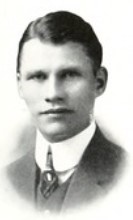
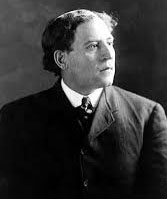
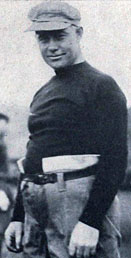
L-R: Andy Smith, Amos Alonzo Stagg, Fielding Yost
The 7-7 tie against defending champion Wisconsin the previous week propelled the Boilermakers into the list of contenders for the conference crown. Chicago would have to defend senior Elmer "Catchy" Oliphant, Purdue's "phenomenal halfback," who scored Purdue's touchdown in the deadlock with the Badgers.
Featured Player Elmer Oliphant's first claim to fame was that he scored 60 points for Linton (IN) High School in their 128-0 slaughter of rival Sullivan High.
He entered Purdue but not on scholarship. So he waited tables, carried laundry, stoked furnaces, and sold shoes to earn his tuition. He earned seven varsity letters in football, basketball, baseball, and track at Purdue. He also swam and wrestled.
Only 5'7" and 175 pounds but with outstanding speed and power, he played end on the freshman football team but became the starting halfback for the next three seasons.
After using up his eligibility at Purdue, Oliphant received an appointment to West Point where he became the first athlete to letter in four major sports.
He was inducted into the College Football Hall of Fame in 1955. |
 |
One newspaper article framed the game like this.
Not since 1905, when Chicago defeated Michigan in the historic 2 to 0 game, has so much interest been shown in the outcome of a game which means the elimination from the conference race of the loser and a stride nearer the coveted goal for the winner. ...
Represented by a team which is rated as the strongest in the history of the institution, the Boilermakers arrived in Chicago yesterday fit and ready for the fray. ...
Coach Smith will send his men into the battle to use every formation and trick they have learned since the season opened. Nothing will be kept under cover.
Represented by a team which is rated as the strongest in the history of the institution, the Boilermakers arrived in Chicago yesterday fit and ready for the fray. ...
Coach Smith will send his men into the battle to use every formation and trick they have learned since the season opened. Nothing will be kept under cover.
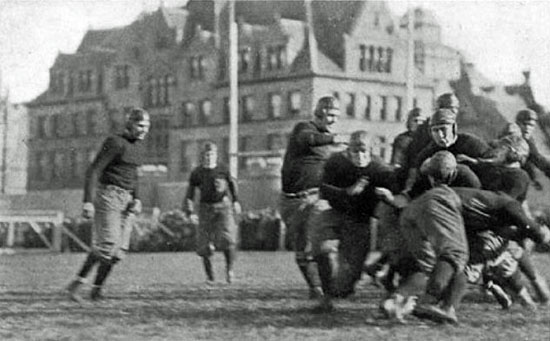
Chicago-Purdue Action (University of Chicago Cap and Gown Yearbook, Class of 1914)
The game showed that the Boilermakers had not been overestimated. Purdue immediately showed one of their weaknesses – the kicking game. A weak opening kickoff gave Chicago possession at midfield. But the Maroons drew three penalties for holding, which was a 20y offense, and two of 5y to negate the good field position. Purdue gained more ground "bucking the line" in the first half but put no points on the scoreboard.
The defenses prevailed until late in the half when QB Pete Russell completed a "long forward pass" to RE Stan Baumgartner to the Purdue 25. On third down, Russell made a first down around left end from fake punt formation. But the Boilermakers held and forced a drop kick field goal by Russell from the 18.
Chicago 3 Purdue 0
Chicago 3 Purdue 0
Under the rules of the day, Purdue kicked off. When the Maroons failed to make a first down, Nelson Norgren boomed a 60y punt that went out of bounds on the Purdue 20 shortly before the end of the first period.
Chicago lost the services of star E John Vruwink on the second play of the second quarter when he was ejected for roughing as his teammates protested vigorously.
Staying on the ground, Purdue moved deeper into Chicago territory but bogged down when three downs gained only 5y. So Oliphant dropped back to the 40 for an attempt at a drop-kick field goal, but the play was a fake, and he was thrown for a 6y loss on Chicago's 40.
The Maroons got another chance to score when Russell returned a punt to the Purdue 20 "by the most brilliant run seen on Marshall Field this season." But the threat ended when Russell threw an interception on the 20.
The half ended with Chicago leading 3-0.
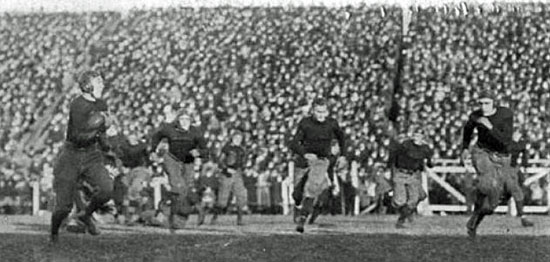
More Chicago-Purdue Action (University of Chicago Cap and Gown Yearbook, Class of 1914)
The Maroons moved right down the field on the first possession of the second half. HB Lauriston Gray started the drive by returning the kickoff to Purdue's 40. Then he skirted the right side to the 22. After a 5y offside penalty against Chicago, Norgren shot a pass to Russell for 7y. After Russell gained 12 from short punt formation, Norgren gained 7y to put the ball on the seven.
Just when it looked like a touchdown or at least a field goal was inevitable, Russell tripped on an end run and lost 5y. Then Gray failed to gain at right tackle. After Russell gained only four on third down, he dropped back to the 22 to try a drop kick. But the ball sailed wide, giving Purdue possession on the 20.
Following an exchange of punts, the Boilermakers made some headway. Facing fourth-and-one on their 22, they went for it and succeeded when FB Herbert O'Brien made the distance. But four snaps later, Oliphant punted to Russell at midfield.
The Maroons drove from there to double their lead. Russell, Gray, and Norgren took turns toting the pigskin for a first down before a pass fell incomplete. But Purdue was penalized for offisde to put the ball on the 24. Runs by Norgren and Stanley Pierce gained another first down. But Chicago soon faced third and eight. When Russell's pass went awry, he kicked another field goal. Chicago 6 Purdue 0
With time running out, the Boilermakers took the air with some success, causing fans to wonder why they didn't throw the ball earlier. Purdue moved within striking distance of the Chicago goal but ran out of time.
FINAL SCORE: CHICAGO 6 PURDUE 0
The Maroons would win all seven games to take the Western Conference championship. Purdue finished 4-1-2 overall, 2-1-2 in the conference.
References
Great College Football Coaches of the Twenties and Thirties, Tim Cohane (1973)
Great College Football Coaches of the Twenties and Thirties, Tim Cohane (1973)